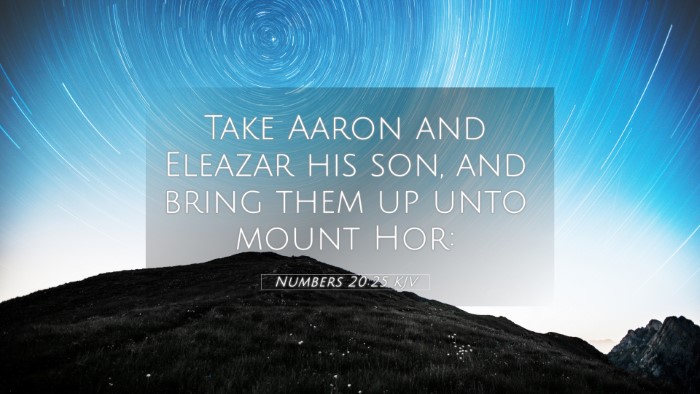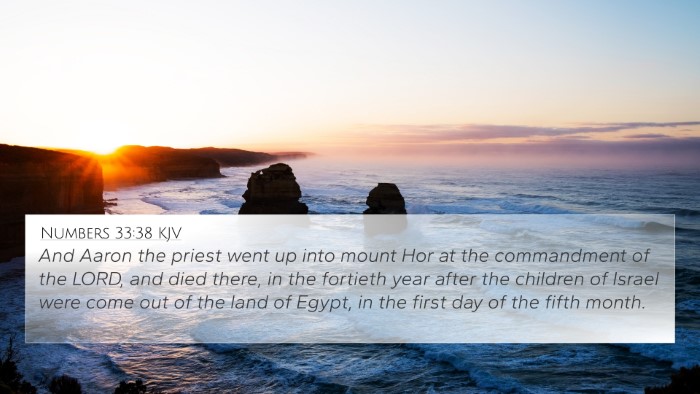Understanding Numbers 20:25
Verse Context: Numbers 20:25 states: "Take Aaron and Eleazar his son, and bring them up to mount Hor:" This verse occurs during a significant transition in leadership and marks an important moment of preparation as the Israelites approach the threshold of the Promised Land.
Meaning and Interpretation
The directives given in this verse reflect critical elements in the journey of the Israelites, highlighting themes of leadership succession, obedience, and divine direction. Notably, the verse emphasizes the seamless transition from one leadership position to another, reminding us of God's continuous guidance throughout His people’s journey.
Leadership and Succession
Matthew Henry’s Commentary notes that the act of Moses taking Aaron and his son Eleazar to Mount Hor symbolizes the passing of responsibility and divine purpose from one generation to the next. It signifies God’s design for continuity in spiritual leadership.
Spiritual Significance of Mount Hor
According to Albert Barnes, Mount Hor represents a sacred place where transitions occur, symbolizing elevated perspectives and the heavenly calling of leadership. The instruction to ascend the mountain implies a need for communion with God in moments of significant transition.
Divine Command and Obedience
As highlighted by Adam Clarke, this command emphasizes the importance of obedience to God's word. The act of taking Aaron and Eleazar to Mount Hor is not merely procedural but aligns with God’s overarching plan for the Israelites, showcasing the necessity of following divine instructions for fulfilling His purpose.
Cross-References
To deepen our understanding of Numbers 20:25, we can explore the following cross-references:
- Exodus 28:1 - The calling of Aaron and his sons to the priesthood, illustrating the significance of leadership roles.
- Numbers 3:1-4 - Establishing the tribe of Levi as the priestly tribe, emphasizing their spiritual responsibilities.
- Leviticus 10:1-3 - The death of Nadab and Abihu, showing the serious nature of serving in the presence of God.
- Deuteronomy 10:6-7 - Refers to the travels of the Israelites, connecting their journey with the divine calling.
- Hebrews 5:4 - Discussing the honor of priesthood, linking to Aaron’s appointed role.
- Matthew 17:1-3 - Jesus’ transfiguration on a mountaintop, underscoring the importance of divine encounters in significant transitions.
- Acts 7:44 - Mention of the Tabernacle of Witness, relating physical representations of divine presence with leadership roles.
Thematic Connections
This verse illustrates several key themes that are woven throughout the Biblical narrative:
- Obedience: The command illustrates the importance of following God's directives.
- Transition: Signifying leadership succession, a recurrent theme in scripture.
- Divine Guidance: It emphasizes reliance on God’s instructions in critical times.
Conclusion
In summary, Numbers 20:25 serves as a pivotal verse illustrating God's ongoing plan for His people, demonstrating the spiritual significance of leadership transitions, obedience to divine instruction, and the importance of sacred spaces in His journey. By examining this verse alongside its cross-references and themes, we gain a richer understanding of God's continuous work with the Israelites and its relevance in today's spiritual context.
Further Study
For those interested in further study, consider the following tools and methods to dive deeper into cross-referencing:
- Bible Concordances: Useful for finding reference verses and thematic connections.
- Cross-reference Study Methods: Applying various techniques to explore relationships between verses.
- Bible Reference Resources: Accessing comprehensive materials that provide insights on linking scriptures.



